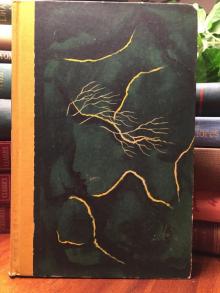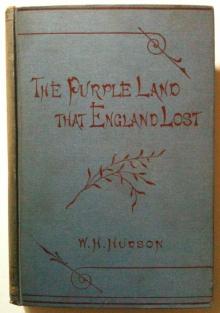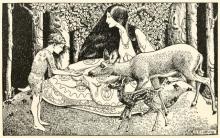- Home
- W. H. Hudson
A Little Boy Lost Page 2
A Little Boy Lost Read online
Page 2
CHAPTER II
THE SPOONBILL AND THE CLOUD
As Martin grew in years and strength, his age being now about seven,his rambles began to extend beyond the waste grounds outside of thefenced orchard and gate. These waste grounds were a wilderness ofweeds: here were the sunflowers that Martin liked best; the wildcock's-comb, flaunting great crimson tufts; the yellow floweringmustard, taller than the tallest man; giant thistle, and wildpumpkin with spotted leaves; the huge hairy fox-gloves with yellowbells; feathery fennel, and the big grey-green thorn-apples, withprickly burs full of bright red seed, and long white wax-like flowers,that bloomed only in the evening. He could never get high enough onanything to see over the tops of these plants; but at last he foundhis way through them, and discovered on their further side a widegrassy plain with scarcely a tree on it, stretching away into theblue distance. On this vast plain he gazed with wonderment anddelight. Behind the orchard and weedy waste the ground sloped downto a stream of running water, full of tall rushes with dark greenpolished stems, and yellow water-lilies. All along the moist banksgrew other flowers that were never seen in the dry ground above--theblue star, and scarlet and white verbenas; and sweet-peas of allcolours; and the delicate red vinegar flower, and angel's hair, andthe small fragrant lilies called Mary's-tears, and tall scatteredflags, flaunting their yellow blossoms high above the meadow grass.
Every day Martin ran down to the stream to gather flowers and shells;for many curious water-snails were found there with brownpurple-striped shells; and he also liked to watch the small birdsthat build their nests in the rushes.
There were three of these small birds that did not appear to knowthat Martin loved them; for no sooner would he present himself atthe stream than forth they would flutter in a great state of mind.One, the prettiest, was a tiny, green-backed little creature, with acrimson crest and a velvet-black band across a bright yellow breast:this one had a soft, low, complaining voice, clear as a silver bell.The second was a brisk little grey and black fellow, with a loud,indignant chuck, and a broad tail which he incessantly opened andshut, like a Spanish lady playing with her fan.
The third was a shy, mysterious little brown bird, peering out ofthe clustering leaves, and making a sound like the soft ticking of aclock. They were like three little men, an Italian, a Dutchman, anda Hindoo, talking together, each in his own language, and yet wellable to understand each other. Martin could not make out what theysaid, but suspected that they were talking about him; and he fearedthat their remarks were not always of a friendly nature.
At length he made the discovery that the water of the stream wasperpetually running away. If he dropped a leaf on the surface itwould hasten down stream, and toss about and fret impatientlyagainst anything that stood in its way, until, making its escape, itwould quickly hurry out of sight. Whither did this rippling, runningwater go? He was anxious to find out. At length, losing all fear andfired with the sight of many new and pretty things he found whilefollowing it, he ran along the banks until, miles from home, he cameto a great lake he could hardly see across, it was so broad. It wasa wonderful place, full of birds; not small, fretful creaturesflitting in and out of the rushes, but great majestic birds thattook very little notice of him. Far out on the blue surface of thewater floated numbers of wild fowl, and chief among them for graceand beauty was the swan, pure white with black head and neck andcrimson bill. There also were stately flamingoes, stalking alongknee-deep in the water, which was shallow; and nearer to the shorewere flocks of rose-coloured spoonbills and solitary big grey heronsstanding motionless; also groups of white egrets, and a greatmultitude of glossy ibises, with dark green and purple plumage andlong sickle-like beaks.
The sight of this water with its beds of rushes and tall floweringreeds, and its great company of birds, filled Martin with delight;and other joys were soon to follow. Throwing off his shoes, hedashed with a shout into the water, frightening a number of ibises;up they flew, each bird uttering a cry repeated many times, thatsounded just like his old father's laugh when he laughed loud andheartily. Then what was Martin's amazement to hear his own shout andthis chorus of bird ha, ha, ha's, repeated by hundreds of voices allover the lake. At first he thought that the other birds were mockingthe ibises; but presently he shouted again, and again his shoutswere repeated by dozens of voices. This delighted him so much thathe spent the whole day shouting himself hoarse at the waterside.
When he related his wonderful experience at home, and heard from hisfather that the sounds he had heard were only echoes from the bedsof rushes, he was not a bit wiser than before, so that the echoesremained to him a continual wonder and source of never-failingpleasure.
Every day he would take some noisy instrument to the lake to startlethe echoes; a whistle his father made him served for a time; afterthat he marched up and down the banks, rattling a tin canister withpebbles in it; then he got a large frying-pan from the kitchen, andbeat on it with a stick every day for about a fortnight. When hegrew tired of all these sounds, and began casting about for some newthing to wake the echoes with, he all at once remembered hisfather's gun--just what he wanted, for it was the noisiest thing inthe world. Watching his opportunity, he got secretly into the roomwhere it was kept loaded, and succeeded in carrying it out of thehouse without being seen; then, full of joyful anticipations, he ranas fast as the heavy gun would let him to his favourite haunt.
When he arrived at the lake three or four spoonbills--those beautiful,tall, rose-coloured birds--were standing on the bank, quietly dozingin the hot sunshine. They did not fly away at his approach, for thebirds were now so accustomed to Martin and his harmless noises thatthey took very little notice of him. He knelt on one knee andpointed the gun at them.
]
"Now, birdies, you don't know what a fright I'm going to giveyou--off you go!" he cried, and pulled the trigger.
The roar of the loud report travelled all over the wide lake,creating a great commotion among the feathered people, and they roseup with a general scream into the air.
All this was of no benefit to Martin, the recoil of the gun havingsent him flying over, his heels in the air; and before he recoveredhimself the echoes were silent, and all the frightened birds weresettling on the water again. But there, just before him, lay one ofthe spoonbills, beating its great rose-coloured wings against theground.
Martin ran to it, full of keen distress, but was powerless to help;its life's blood was fast running away from the shot wounds it hadreceived in its side, staining the grass with crimson. Presently itclosed its beautiful ruby-coloured eyes and the quivering wings grewstill.
Then Martin sat down on the grass by its side and began to cry, Oh,that great bird, half as tall as himself, and so many times morelovely and strong and beautiful in its life--he had killed it, andit would never fly again! He raised it up very tenderly in his armsand kissed it--kissed its pale green head and rosy wings; then outof his arms it tumbled back again on to the grass.
"Oh, poor bird," he cried suddenly, "open your wings and fly away!"
But it was dead.
Then Martin got up and stared all round him at the wide landscape,and everything looked strange and dim and sorrowful. A shadow passedover the lake, and a murmur came up out of the rushes that was likea voice saying something that he could not understand. A great cryof pain rose from his heart and died to a whisper on his lips; hewas awed into silence. Sinking down upon the grass again, he hid hisface against the rosy-breasted bird and began to sob. How warm thedead bird felt against his cheek--oh, so warm--and it could not liveand fly about with the others.
At length he sat up and knew the reason of that change that had comeover the earth. A dark cloud had sprung up in the south-west, faroff as yet, and near the horizon; but its fringe already touched andobscured the low-hanging sun, and a shadow flew far and vast beforeit. Over the lake flew that great shadow: the waters looked cold andstill, reflecting as in a polished glass the motionless rushes, theglassy bank, and Martin, sitting on it, still clasp
ing in his armsthe dead rose-coloured bird.
Swifter and vaster, following close upon the flying shadow, came themighty cloud, changing from black to slaty grey; and then, as thesun broke forth again under its lower edge, it was all flushed witha brilliant rose colour. But what a marvellous thing it was, whenthe cloud covered a third of the wide heavens, almost touching thehorizon on either side with its wing-like extremities; Martin,gazing steadily at it, saw that in its form it was like an immensespoonbill flying through the air! He would gladly have run away thento hide himself from its sight, but he dared not stir, for it wasnow directly above him; so, lying down on the grass and hiding hisface against the dead bird, he waited in fear and trembling.
]
He heard the rushing sound of the mighty wings: the wind theycreated smote on the waters in a hurricane, so that the reeds werebeaten flat on the surface, and a great cry of terror went up fromall the wild birds. It passed, and when Martin raised his bowed headand looked again, the sun, just about to touch the horizon with itsgreat red globe, shone out, shedding a rich radiance over the earthand water; while far off, on the opposite side of the heavens, thegreat cloud-bird was rapidly fading out of sight.

 Green Mansions: A Romance of the Tropical Forest
Green Mansions: A Romance of the Tropical Forest The Purple Land
The Purple Land A Little Boy Lost
A Little Boy Lost